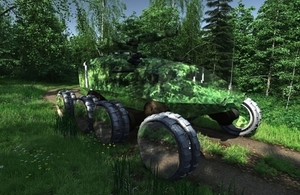Persistent surveillance from the air with novel radar system
Case study from the University of Birmingham who pitched their ideas to industry and investors at the CDE Marketplace on 27 April 2016.

The University of Birmingham was funded by the Centre for Defence Enterprise (CDE) to build a proof-of-concept radar system for use on high-altitude platforms, which can detect slow-moving targets in dense foliage.
The system, known as SIMITAR, is a multiple-input and multiple-output (MIMO) towed radar array. This creates a long virtual array while reducing the number of physical elements required. This allows for use on a wide range of manned and unmanned air platforms, optimises moving target indicator performance and computational efficiency, while maintaining synthetic aperture radar capability.
Initial work has shown that SIMITAR is not only feasible and operable from a platform as light as a high-altitude pseudo-satellite (HAPS), but competitive in terms of its performance too. Studies have revealed that the system can detect very slow-moving targets (~1 m/s), in dense foliage, and at stand-offs of up to tens of kilometres. A technology demonstrator has also been built to put the system to the test.
Dr Mike Antoniou, Lecturer in Radar Sensors and Systems, University of Birmingham says:
The funding and support we got from CDE has allowed taking our research to the next level.
The University of Birmingham was first founded in 1900 as England’s first civic University. It comprises more than 6,500 staff and has students in excess of 28,000.
View the pitch presentation slides.
About CDE
CDE funds novel, high-risk, high-potential-benefit research. We work with the broadest possible range of science and technology providers, including academia and small companies, to develop cost-effective capabilities for UK armed forces and national security.
CDE is part of Dstl.
Centre for Defence Enterprise
Building R103
Fermi Avenue
Harwell Oxford
Oxfordshire
OX11 0QX
Please email for the quickest response.